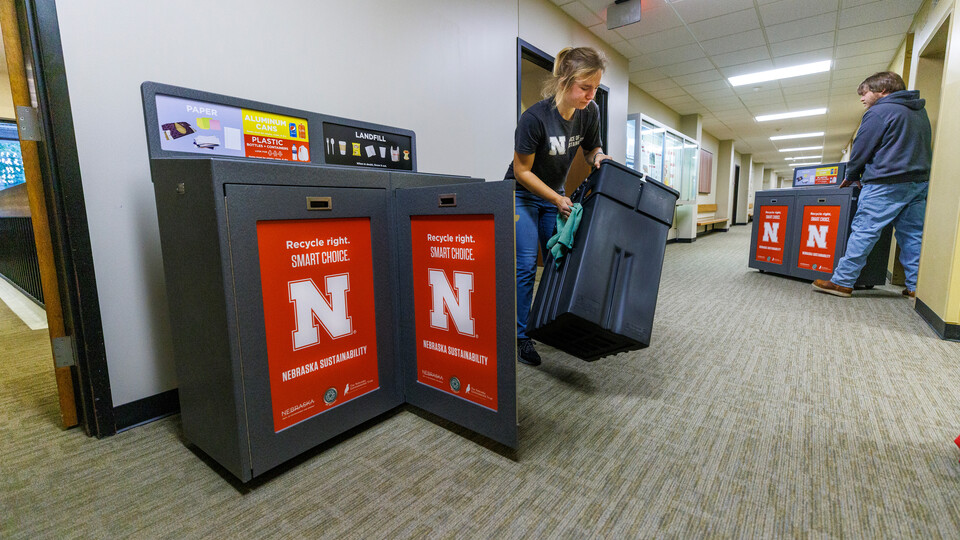
Hundreds of campus community members now have the opportunity to contribute to campus sustainability with the continued rollout of the All in the Hall program.
In December, All in the Hall expanded into ten additional campus buildings, adding to the 19 buildings that have already implemented the program. With approval from University leaders, All in the Hall will be implemented campus-wide over the next few years to provide a consistent recycling program across campus and make progress toward institutional sustainability goals. The implementation consists of adding new, streamlined recycling stations in high-traffic areas within each building. These stations give campus community members the opportunity to take sustainability efforts into their own hands by increasing their mindfulness of the waste they produce and choosing to recycle the right materials.
The new buildings are:
• Avery Hall
• Facilities Management and Planning
• Louise Pound Hall
• Manter Hall
• Schorr Center
• Agricultural Communications Building
• Barkley Memorial Center
• Entomology Hall
• Leverton Hall
• McCollum Hall
All in the Hall grew out of the Recycling Pilot Project, which started in eight buildings in 2020. The project’s success led to the widespread implementation of what came to be known as the All in the Hall program. The pilot was so successful that the libraries requested to join the first phase of All in the Hall.
“When the Dinsdale Family Learning Commons opened on East Campus, the pilot project was implemented in the space,” said Regina Flowers, learning commons and events coordinator for the libraries. “We were so pleased with the results we asked the Office of Sustainability how soon we could get Love Library into the program.”
So far, the program has helped the library conserve resources.
“It absolutely saves us time and labor,” Flowers said. “Hundreds of people come through Love Library every day, thousands when it was particularly busy. The partnership between the Office of Sustainability and Custodial Services allows us to provide a level of recycling in our public space that we were unable to keep up with on our own.”
All in the Hall is the latest initiative that demonstrates the university’s commitment to sustainability, outlined in the Environment, Sustainability and Resilience Master Plan. The plan outlines aspirational goals, including one that strives for a zero-waste culture across campus. Huskers can contribute to this by utilizing the recycling stations placed around the university.
The recycling stations are designed to make recycling easier. The recycling stations are standardized, and feature visual cues at eye-level, helping Huskers decipher which of their items are recyclable. The stations also feature shape-restrictive openings to cue users on which items go where, making recycling more intuitive.
The waste stations have four streams — paper, aluminum cans, plastic bottles and containers, and landfill. Corrugated cardboard is also accepted at the stations and should be flattened and placed behind the stations. Items placed in any recycling stream should be clean, dry, and free of food or other non-recyclable waste.
Custodial Services staff will no longer collect landfill waste from private office spaces in the campus buildings. Rather, they will focus on servicing all waste streams from the centralized locations, including both landfill and recyclable materials. By focusing efforts on centralized locations, custodial services can help buildings like Love Library manage their waste more efficiently.
“Maintaining the recycling in Love Library was a large task,” said Brent Morgan, facilities coordinator. “The complex is sprawling, and we had recycling containers throughout. Our student workers were servicing the receptacles several times a day. Having the All in the Hall program has freed up our student workers to focus on Library specific tasks. “An organized solution to the university’s recycling needs was long overdue and this program fit the need within the libraries perfectly,” Morgan said.
Once the items are collected by Custodial Services, UNL’s Refuse and Diversion Services team transports landfill materials to the Buff Road Landfill and recyclable materials to Green Quest Recycling in Lincoln, where they begin their journey to a second life.
Implementation of the All in the Hall program is led by the Office of Sustainability with major support from Custodial Services. Those with questions about the program can reach out to the Office of Sustainability.
Looking forward, Flowers recommends that other campus buildings welcome the new program.
“I think it’s important to have All in the Hall in as many campus buildings as possible, and I would recommend other buildings implement the program,” she said. “The consistency in types of bins, locations of bins and signage is very helpful We have found that people want to recycle, but it can be confusing when practice vary depending on the building you are in.”
More details at: https://news.unl.edu/newsrooms/today/article/all-in-the-hall-rollout-promotes-sustainability-campuswide/